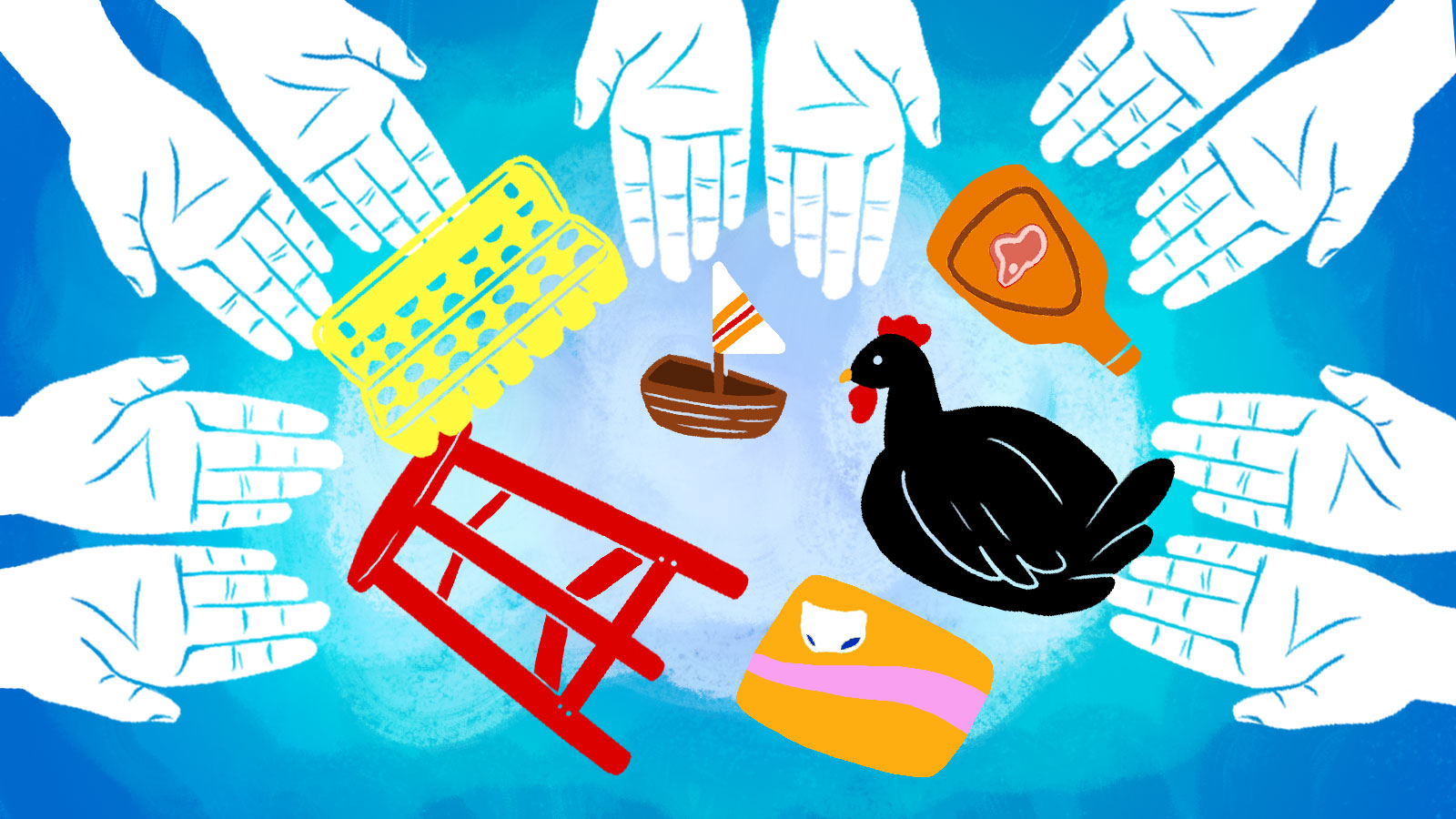I’ve long been a fan of Buy Nothing Day, the spunky alterna-holiday that shoots spitballs at Black Friday.
And now, thanks to the Buy Nothing Project, it’s easier than ever to buy nothing all year long. I discovered the project when a friend invited me to join a local Buy Nothing Facebook group. (Thanks, Kristen!) The first such group was launched on Bainbridge Island, Wash., in July 2013. It proved so popular that it soon started splintering and spreading. Now there are about 300 such groups around the U.S., Canada, and a handful of other countries, with some 80,000 members. (If there’s not one in your neighborhood, you can start one up.)
The rules for the Buy Nothing Project’s local Facebook groups are simple:
Post anything you’d like to give away, lend, or share amongst neighbors. Ask for anything you’d like to receive for free or borrow. Keep it legal. Keep it civil. No buying or selling, no trades or bartering, we’re strictly a gift economy.
Let me tell you, I love the local group for my Seattle neighborhood, Buy Nothing Ballard. It warms the heart of this cynical climate hawk every day. I don’t even need to actively participate to feel good — I just watch posts in my Facebook feed of people generously offering things, and posts of other people gratefully receiving those things, and it’s like a little stream of warm fuzzies pinging me all day long. Also, it cracks me up.
People in my group offer lots of household goods, clothes, furniture, electronics, and kids’ stuff. And they ask for things like coupons to local stores and tea cups to borrow for a Girl Scout tea party. And they collect goods for the homeless. All of which is excellent. But it’s the unusual stuff that I get a real kick out of. Like the woman who asked for people’s excess Benadryl tablets to administer to her rescue dog on the advice of her vet while she saves up for surgery; another Buy Nothinger stepped right up and offered her a Costco bottle of 500 tablets. Love it.
Consider this list of 10 awesome things that I’ve seen offered — and accepted! — in this group:
- One bottle of Ken’s Steak House Lite Apple Cider Vinaigrette. The giver explained: “Found this on sale and tried it on a whim. Not so much our style. Opened about a month ago, exp. 5/2015. Mostly full.”
“Heck yes!” was the enthusiastic response of the taker. “We love Ken’s!”
- Patagonia puffer jacket with missing zipper. The owner ripped out a bad zipper, intended to replace it, ran out of steam.
Numerous people volunteered to take the jacket and sew in a new zipper.
- Two 2.5-year-old backyard chickens, alive.
Quickly adopted.
- Stools, broken.
A Buy Nothinger was happy to get them and fix them up.
- A boat, not broken.
No problem finding a taker for that one.
- A mostly full package of Depends.
Snapped right up.
- Half-finished heart-shaped pot holders. Wrote the giver: “I started sewing these last Xmas, and didn’t complete them. If you would like to complete them for gifts (requires a sewing machine), or have other use for the materials, let me know!”
Another Buy Nothinger took over the project.
- An extremely adorable bunny.
Adopted by a family with a 9-year-old autistic child who loves animals.
- A package of Elmo cake decorations, one-third used up.
Gratefully accepted by a mom whose son’s birthday was approaching.
- Half a dozen empty egg cartons.
I didn’t think anyone would go for these — just regular ol’ empty egg cartons. But what did I know? Some crafter had a need. Or maybe it was the person who adopted the chickens.
Much of this is small stuff, but it spreads enthusiasm for a less-consumptive lifestyle. And the whole enterprise spreads good vibes and a spirit of generosity. Seeing people give away things makes me want to give away things. I can attest that it feels great to take something I don’t want anymore, get it out of my house, and make someone else happy at the same time. And it’s a special treat when I can get a new little something for myself without having to turn to the consumer-industrial complex. (Thanks, Anna, for the brand-new scarf! I gave it its first outing today.)
Freecycle groups have been around for years, offering some of these same joys of sharing and reuse, and Yerdle is a newer startup that’s trying to do the same. I’ve happily Freecycled dozens of items over the years. But the Buy Nothing Project groups are more hyper-local (for a specific neighborhood rather than a city or metropolitan area), more interactive and flexible, and more focused on community-building. Cofounder Rebecca Rockefeller explains the difference:
Freecycle’s mission (and it’s a great one) is to keep useful items out of the landfills. Our mission is to create local gift economies that tie people together, to inspire a rethinking of use, reuse, and sharing of resources within communities.
Speaking of gift economies that tie people together, this Buy Nothing group story made me misty-eyed last week. A woman in Kirkland, Wash., asked on her local Buy Nothing Facebook page to borrow a dress for her courthouse wedding, so she could feel pretty for the day. She and her fiancé have a family and are trying to save for school and a house, so they don’t have money to spare for luxuries. The Buy Nothing Kirkland group rallied — not just with a dress, but with a whole wedding: a venue, flowers, a photographer, a DJ, party favors, an Italian buffet, and babysitting services, all donated free of charge. And the Buy Nothing givers attended the wedding. Now that’s some community-building.
Local groups have less-dramatic face-to-face events too, to help neighbors get to know each other and create community IRL. I haven’t been to a meatspace gathering yet, but there’s a gift exchange this Sunday. I’m planning to spend some time on Black Friday Buy Nothing Day digging through my closets and basement for unused items that might make nice gifts for someone else.
There’s a lot of talk these days about the sharing economy, which in most cases would be more accurately described as the renting economy — you rent a place to stay on Airbnb, you rent a driver with Lyft, you rent a Smart car via car2go. This kind of renting can be great — I use all of these services.
But actually sharing — giving something, expecting nothing in return — is a whole nother thing, and a whole level better.



